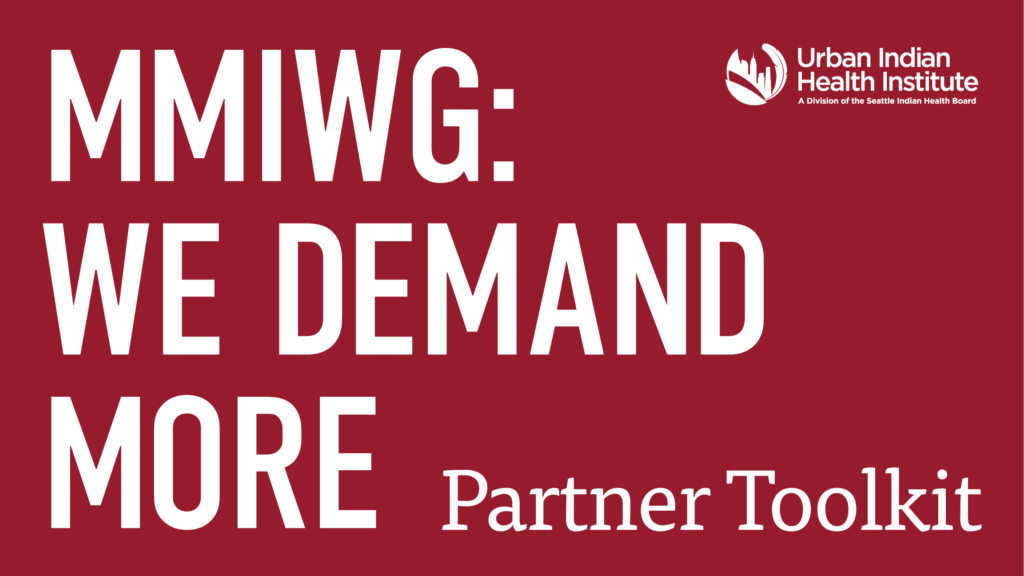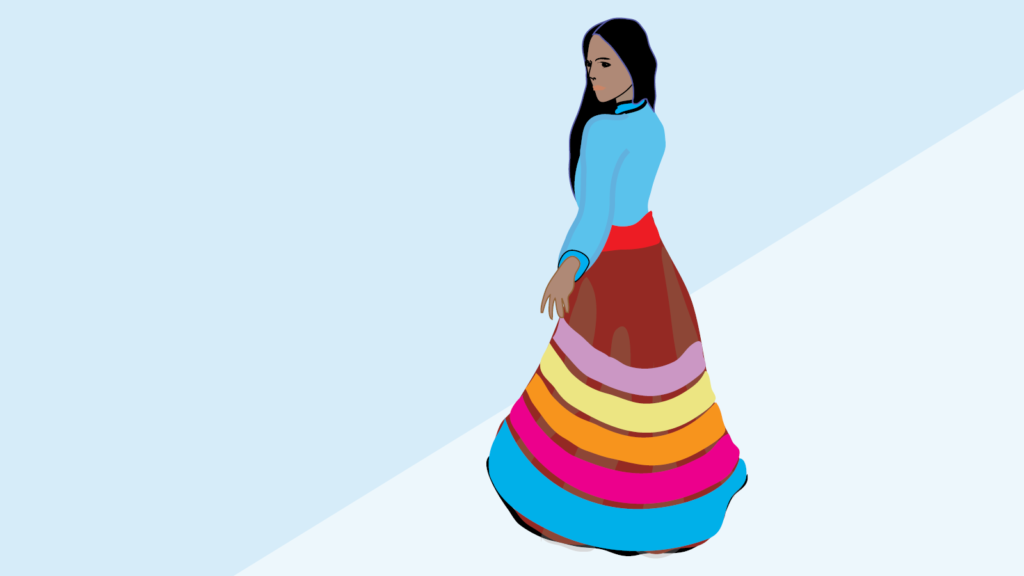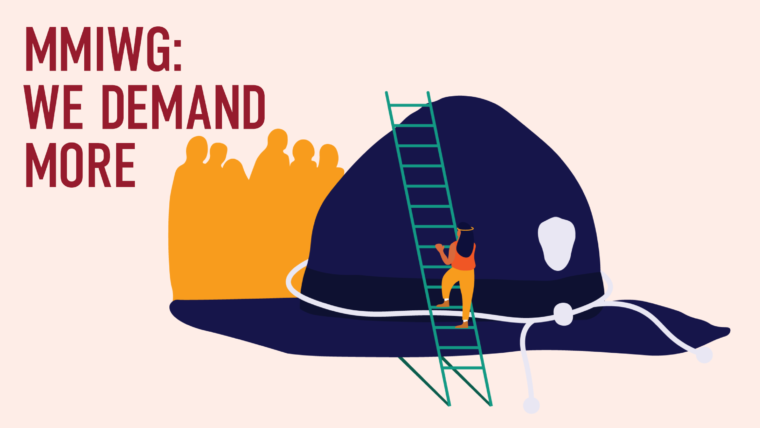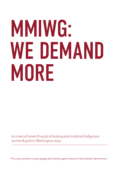Missing and murdered Indigenous women and girls (MMIWG) is not a new crisis in the United States. This continuous and pervasive assault on our matriarchs has existed since colonizers set foot on this land. Decades of advocacy and activism fell on deaf ears, while more and more of our women went missing and were murdered. And while their families sought justice, they were shown at every turn by police and government agencies that Indian women and girls don’t count.*
Since the release of Urban Indian Health Institute’s (UIHI) report titled Missing and Murdered Indigenous Women & Girls: A snapshot of data from 71 urban cities in the United States, the attention around the MMIWG crisis has grown tremendously. Legislators, government agencies, and media have been forced to pay attention because of the relentless work by the families of MMIWG victims, grassroots activists, tribes, and Native organizations across the country.
As of September 2019, for the first time, several states across the country passed legislation meant to address this crisis in their communities including developing and investing in resources that will improve the safety of Indigenous women. Each of these states will likely be measuring the quality of their work against their peers. If that first one is not done well, which we just witnessed with Washington State Patrol’s recent MMIWG report, history shows us we see these subpar efforts mimicked throughout the country. This will lead to the same situation our women have been in for centuries—one fueled by institutional racism, causing Native women to be invisible.
The current MMIWG policy landscape
At the time of this report’s publication, there are four federal bills and twelve state bills (in 10 different states)—including two in Washington—all seeking to address various issues ranging from the collaboration with various levels of police to improved data tracking of MMIWG cases.
Washington passed the first of such legislation, Substitute House Bill 2951, acknowledging the MMIWG crisis in Washington and seeking to establish strategic partnerships with tribes and urban Indian communities to address the high numbers of missing women in the state.
The legislation specifically directed Washington State Patrol to “work with the Governor’s Office of Indian Affairs to convene meetings with tribal law enforcement partners to determine the scope of the problem, identify barriers, find ways to create partnerships to increase reporting and investigation, and compile and analyze available data of missing Native American women.”1
On June 1, 2019, Washington State Patrol submitted its “study”—authored by Captain Monica Alexander (retired) and titled Missing and Murdered Native American Women Report—to the Washington State Legislature.
Why we are demanding more
Despite this direct mandate from the Washington State Legislature, the report was woefully incomplete and did not fully, if at all, answer this mandate put forth in Substitute House Bill 2951. The report is an imprecise recounting of the 10 meetings held with tribal nations and community members across the state with no meaningful or scientifically based analysis of the knowledge shared in those meetings.
In addition, Bill 2951 mandated the analysis of quantitative data related to the number of missing American Indian/Alaska Native women and girls in Washington State, yet the data contained in Washington State Patrol’s report were simple counts and did not include any meaningful analysis. It also did not address the rampant racial misclassification of American Indian/Alaska Native victims that results in an undercount of those missing despite this being a leading concern expressed across the community meetings.
As a result of the incomplete report issued by Washington State Patrol—that offers no meaningful contribution to addressing missing Indigenous women and girls—the authors of this report recognize that it was imperative to respond and to fulfill the legislative mandate as originally directed by the Washington State Legislature.
We will not sit by and watch our loved ones disappear.
More effort is needed and demanded
UIHI recognizes research, data, and evaluation as Indigenous values. By doing so, we have a responsibility to our community, tribal leaders, elders, and youth to use our expertise in these areas to hold systems and bureaucracies accountable in the fulfillment of their mandated responsibilities to Indigenous people.
Washington had the opportunity to lead the nation in addressing MMIWG. Instead, this report showed minimal efforts that have little to no effect on addressing this crisis. It is our duty to ensure our communities are protected, and not just in the data. Washington State Patrol’s report does not show the effort needed to ensure that protection.
Our missing and murdered loved ones have been invisible for way too long, and we will not stand aside and let it continue. We will not let the lives of Native women be a checkbox that meets minimum requirements.
Our community has worked tirelessly to get where we are today. We are moving beyond raising awareness and are demanding action. We are demanding more effort by others and will hold them accountable.
To do this, I gathered individuals who donated their time to ensure justice for our women and girls for this unfunded report. The co-authors and I bring experience in our respective fields of federal Indian law, qualitative and quantitative data analysis, and research. We also bring a deep personal understanding of the issues in Indian Country that inform the culturally attuned approaches that are required to do this work effectively with urban and rural Native communities.
It’s going to take this type of experience to truly address the MMIWG crisis—experience that was not part of the Washington State Patrol report.
The longer it takes…
As politics and government processes run their course, we will continue to hear new stories of Native women and girls being found dead and reported missing. More families will be seeking answers and wondering why this is happening to their daughters, their granddaughters, their mothers, their grandmothers, their cousins, their aunties, and their friends.
And they will continue to ask who is responsible, and why is nothing being done?
*We use the terms Native, Native American, and American Indian/Alaska Native interchangeably in this report to acknowledge the varying ways that North American Indigenous peoples are forced to identify within the American racial structure and English language.
Updated: Sep 20, 2019
A research study addressing the lacking report Washington State Patrol released about the MMIWG crisis

Resource
We Demand More: Partner Toolkit
This report and toolkit can be used as a call to states around the country to do better when it comes to addressing the MMIWG crisis.

Project
Our Bodies, Our Stories
Our work to advocate and provide data to protect Native women.


